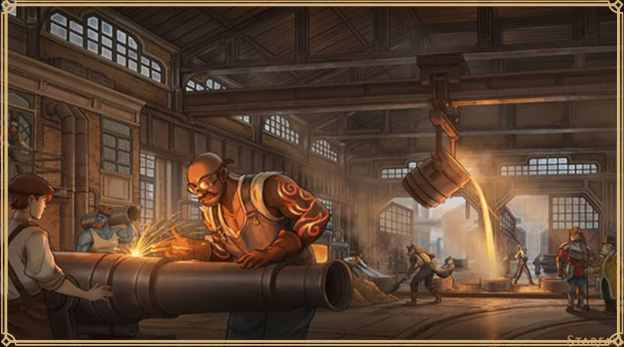Arcadia

“While some nations are blessed with bountiful resources, such as the Lumite-rich sands of Al Sula, it seems to be that for the Arcadian Empire, their people’s exploitation is the wellspring of their triumphs.” – Jia Sunmar, Kyran Ambassador
Amidst the frost-laden lands and bitter skies of North Eastern Illum, the beginnings of a new human republic emerged. As the Age of Dwarves waned from the realm of Lyra, a handful of human lords met, wearied by the violent Norvund raids that had plagued their people for far too long. They crafted an alliance, united under one banner against their common foe, intent on no longer allowing their people to spend their days swathed in fear. And so, Arcadia was born, imbued with an indomitable spirit and unmatched resilience. Though lacking the bountiful lands of Montaigne or the Lumite-rich deserts of Al Sula, the infantile Arcadia possessed an iron will, refusing to be dwarfed by its more prosperous and powerful neighbors.
Arcadia’s rise from middling republic to flourishing empire began at the epoch of the War of Colors, a time steeped in despair, as the allies of the Akari Order were burdened by successive Nai victories. But Arcadians had been forged in the fires of attrition, they would not easily yield . In a decision that would alter the course of the war, the elected Arcadian senate granted a temporary but absolute rule to Gaius Cassius Acquila, a serviceable politician at best, but a brilliant military commander. With the fate of Arcadia laid bare before him, Cassius turned to their enemies, weaponizing a combination of lethal cunning and military viciousness that would earn him his place in the pages of history. Calling upon the nation’s legendary Phoenix Riders, he led the allied forces through the darkest moments of the war, banishing the shadows and seizing victory.
Now celebrated and adored by the Arcadian citizens, Cassius had drank too deeply from the well of victory. Drunk on power and hubris, he refused to relinquish his position, declaring himself Emperor until his death, and dissolving the senate. In its stead, he formed the Imperium, composed only of those from the houses of the Phoenix riders, to honor their invaluable contributions to the war. The only royally recognized bloodlines, these houses were solely granted the honor of bearing the Phoenix crest in their sigils. The Imperium was entrusted with the task of selecting the Emperor’s successor, supposedly based on merit and honor. However, the Imperium rarely chose a successor without first breeding assurances to maintain the status of the Arcadian elite.
Despite the Imperium’s tendency to promote successors from within the Houses, their shrewd judgment allowed them to occasionally look beyond their own kin for the most suitable candidates. One such outsider was the cunning and calculated Lucius Valerius.
When the War of Shadows plunged Lyra into darkness once more, it was Valerius who emerged as the guiding light, leading Arcadia to a triumphant victory. Recognizing the importance of allies in securing Arcadia’s position, Valerius single handedly negotiated a strategic alliance with the Island nation of Leòn. He also played a critical role in crafting the New Dawn Accords, a treaty that brought much-needed stability to the land.
Yet, despite his mastery of diplomacy, Valerius’s silver tongue could not sway the Mainland nations on a singular issue, but one crucial to Arcadia’s economy. The Alliance had resolved to abolish slavery, a practice that had fueled Arcadian prosperity in the absence of fertile lands or natural resources. In a desperate bid to protect Arcadia’s future, Valerius quietly campaigned to undermine the Mainland’s intention to ban slavery. But the nations of the New Dawn Accords stood firm, and slavery was ultimately banned for all signing nations.
Despite the loss of their most prized resource, Valerius recognized that the benefits Arcadia would reap from the Accords were too advantageous to reject. Instead, he crafted a solution that would allow for both signing and slavery, as Arcadia would not yet part with their reliance on unpaid labor. The solution arrived in the form of a new Justice System, proposed by Arcadian slave owners and immediately approved by the Imperium. This new system dissolved all criminal prisons and war camps, replacing them with “manual labor corps,” a program in which all prisoners would be required to serve years of service, determined by court-mandate.
Individuals that found themselves unfortunate enough to fall into such a program were stripped of their identity, their name struck from all official records and replaced by a number. This number was tattooed or branded onto their neck, and so they became the Nameless. Outrage spread throughout the Alliance, as those who had fought against slavery now found their efforts undermined. But Arcadia had played by the rules, nothing could be done to relieve them of their vile industry.
This cruel new system of neo-slavery, reviled by their own allies, undeniably propelled the Arcadian Empire into an era of industrialization and innovation. Mastering airship technology, a feat that had previously only been attained by the Dwarves, Arcadia became the first colonizer of the previously undisturbed Skylands. By the time of Lucius’ death, the Arcadian Empire had arguably become the most powerful nation Lyra had ever seen and one of the most influential members of the Mainland Alliance. But for all they achieved, the legacy of the Arcadian Empire would forever be stained by the realization that their wealth and power were built on the backs of the Nameless. For where every one could find a sliver of progress, a technological marvel or economic triumph, there too, were countless souls whose lives had been broken and ruined.
“While some nations are blessed with bountiful resources, such as the Lumite-rich sands of Al Sula, it seems to be that for the Arcadian Empire, their people’s exploitation is the wellspring of their triumphs.” – Jia Sunmar, Kyran Ambassador



